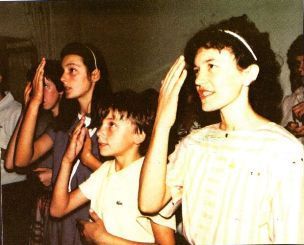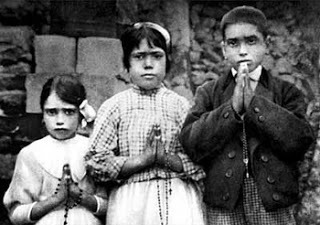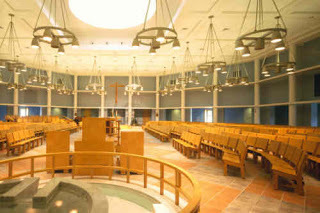Dwight Longenecker's Blog, page 335
October 14, 2011
Remember...
Published on October 14, 2011 05:26
Teddy Bear
Published on October 14, 2011 05:23
Footprints in the Sand

One night I had a dream--
I dreamed I was walking along the beach with the Lord
and across the sky flashed scenes from my life.
For each scene I noticed two sets of footprints,
one belonged to me and the other to the Lord.
When the last scene of my life flashed before me,
I looked back at the footprints in the sand.
I noticed that many times along the path of my life,
there was only one set of footprints.
I also noticed that it happened at the very lowest
and saddest times in my life.
This really bothered me and I questioned the Lord about it.
"Lord, you said that once I decided to follow you,
you would walk with me all the way,
but I have noticed that during the most troublesome times in my life
there is only one set of footprints.
"I don't understand why in times when I needed you most,
you should leave me."
The Lord replied, "My precious, precious child,
I love you and I would never, never leave you
during your times of trial and suffering.
"When you saw only one set of footprints,
it was then that I carried you."
Published on October 14, 2011 05:21
Bald Angry Guy
[image error]
A much loved reader of this blog commented that the tone of the posts of late are rather 'ranting' and recently other much loved friends and colleagues have noted that I am 'angry' and 'frightening'. Wot me?
I admit that this is an unfortunate aspect of my character. What I perceive as determination communicates as stubbornness. What I perceive to be strength of character and convictions comes across as aggression and bullying. What I perceive to be initiative others perceive as ambition. What I perceive as being pro active others think is lack of consultation. When I think I am minding my own business others think I am aloof, or snobbish even. What I perceive as single mindedness comes across as insisting on my own way. What I perceive to be clarity of vision and understanding of complex problems comes across as being an insufferable know it all.
Alas, the Scottish bard was right: "O would some power the giftie gie us to see ourselves as others see us.
Therefore, for the pleasure of all those who find me to be some sort of frightening Jeremiah--a prophet of terrifying demeanor--a veritable voice of one crying in the wilderness--a Jerome, a St John Chrystostom--an incorrigible curmudgeon--a series of uplifting and charming posts shall follow....
A much loved reader of this blog commented that the tone of the posts of late are rather 'ranting' and recently other much loved friends and colleagues have noted that I am 'angry' and 'frightening'. Wot me?
I admit that this is an unfortunate aspect of my character. What I perceive as determination communicates as stubbornness. What I perceive to be strength of character and convictions comes across as aggression and bullying. What I perceive to be initiative others perceive as ambition. What I perceive as being pro active others think is lack of consultation. When I think I am minding my own business others think I am aloof, or snobbish even. What I perceive as single mindedness comes across as insisting on my own way. What I perceive to be clarity of vision and understanding of complex problems comes across as being an insufferable know it all.
Alas, the Scottish bard was right: "O would some power the giftie gie us to see ourselves as others see us.
Therefore, for the pleasure of all those who find me to be some sort of frightening Jeremiah--a prophet of terrifying demeanor--a veritable voice of one crying in the wilderness--a Jerome, a St John Chrystostom--an incorrigible curmudgeon--a series of uplifting and charming posts shall follow....
Published on October 14, 2011 05:15
October 13, 2011
The Day I Saw the Sun Spin

It was the early 1980s. I was living and working in England as an Anglican priest. A group of parishioners got me to go with them and a group of Catholics to Medjugorje. (OK, spare me the whole Medjugorje hoax controversy, I'm not sure what to think about all that. I'm only telling you what happened.)
At six o'clock the whole town would stop to pray the rosary, and by six twenty the first two sets of mysteries would be completed. Then at 6:20 the visionaries would have their daily vision of the Blessed Virgin Mary.
So I'm sitting on the balcony of the guesthouse with my friend Eleanor praying the rosary. When we began the rosary at 6:00 I looked at the sun. It was a blaze of light in the sky above. The blaze of light was reflected on the hood of the car parked below the balcony where we were sitting.
I'm praying the rosary with my eyes closed and at 6:20 Eleanor gives me an elbow in the ribs. I look up and the sun is now a white disc in the sky, and it is spinning around like a Catherine wheel with sparks shooting off the edge. I can't believe my eyes and look away. I look down to see the reflection of the sun in the hood of the car. The reflection is spinning like a Catherine wheel too.
I'm not making a statement about Medjugorje. I'll leave that judgement up to the Pope.
I'm just saying what happened to me.
Did the sun really spin? Of course not. Something else happened, and I wasn't the only one who saw it spin that day, but I can't explain it.
By the way, the rosary I bought in Medjugorje was a pewter color when I bought it. I brought it home--unopened and unused, and when I got it home the metal had changed to a gold color. I can't explain that either.
Published on October 13, 2011 16:41
What Happened at Fatima?

Richard Dawkins loves to make fun of miracles, and one of the favorite objects of his mockery is the miracle of the sun at Fatima. He snorts in derision, (and I paraphrase) "Obviously the sun did not dance and plunge to the earth. We know the sun is billions of times bigger than the earth. If the sun plunged to the earth there would be no earth. Clearly there was no miracle of the sun at Fatima..."
Or here's how another atheist puts it: "It is not easy to explain how 70,000 people could share the same hallucination. But it is even harder to accept that it really happened without the rest of the world, outside Fatima, seeing it too — and not just seeing it, but feeling it as the catastrophic destruction of the solar system, including acceleration forces sufficient to hurl everybody into space. David Hume's pithy test for a miracle comes irresistibly to mind: "No testimony is sufficient to establish a miracle, unless the testimony be of such a kind, that its falsehood would be more miraculous than the fact which it endeavours to establish." It may seem improbable that 70,000 people could simultaneously be deluded, or could simultaneously collude in a mass lie. Or that history is mistaken in recording that 70,000 people claimed to see the sun dance. Or that they all simultaneously saw a mirage (they had been persuaded to stare at the sun, which can't have done much for their eyesight). But any of those apparent improbabilities is far more probable than the alternative: that the Earth was suddenly yanked sideways in its orbit, and the solar system destroyed, with nobody outside Fatima noticing."
This is typical of the stupid literalistic 'reasoning' of the atheists. Errm, those of us who believe in the miracle of the sun also know that the sun is much bigger than the earth. We also know that if the sun were really spinning that everyone on earth should be able to see it. We also know that if the sun plunged to earth the earth would be toast. Yet we believe in the miracle of the sun.
So we clearly believe that something else happened other than the literal event of the sun being yanked from the sky and plunging to earth. What a shame the smug atheists didn't stop to ask whether we had though these things through or not? Unlike the scientist atheists (who are supposed to examine phenomena objectively) we examine the phenomena objectively. Here we have documentary and eyewitness and photographic evidence that 70,000 people 'saw' the sun spin, felt it was yanked from the sky and that it plunged to earth. Everyone said they saw the same thing. Everyone was so frightened they screamed and ran for their lives. Clearly something happened, what was it?
We can rule out any literal explanation. The sun didn't fall to the earth. But 70,000 people saw it fall to the earth. The miracle therefore occurred somewhere within the process of perception. We see with our eyes, but what do we see? Whatever we see is transferred to the brain and the brain interprets what we see. It is well known that if we do not have the mental capacity to 'see' certain things they are invisible to us. Likewise we may 'see' certain things, and without the capacity or mental vocabulary to process what we have seen they will remain a mystery to us, or we will process what we see in terms of what we know. The mind makes sense of what we see, and tries to interpret it the best it can.
So the miracle of the sun at Fatima was a miracle that occurred within the minds of 70,000 witnesses. Does this mean "It was only in their mind?" or that "They had merely imagined it"? No. They really did see the sun spinning, being yanked from the sky and plunging to earth, but the way they 'saw' it was with some other capability than the usual kind of 'seeing'. They 'saw' something in the same way that the visionaries 'see' the Blessed Virgin who is not there in a normally physical way.
Some skeptics may wish, therefore, to dismiss the miracle and say it was merely some sort of psychic phenomena for which we do not yet have an explanation. Fair enough, but that is what believers usually call a 'miracle.'
Published on October 13, 2011 16:21
October 12, 2011
Bums and Billionaires
I reckon something good is coming out of the Wall Street occupation: it's getting people talking about one of the seven deadly sins. We really should be talking about greed. We should be talking about how violent a sin greed is. It is violent because the greedy person will invariably do some sort of violence against another person in order to advance his avarice.
The violence may be in the form of harsh working conditions, unfair competition, firing people un necessarily for profit or any other number of ultimately violent actions stemming from the initial sin of greed, so let's talk about greed, and let's be down on greed and up on generosity.
However, greed (like every sin) can only be rightly discussed in a religious and theological context because only there can it be discussed objectively. As soon as greed (or any other sin) is discussed in an ideological or social context the discussion of the sin becomes distorted by the assumptions of class warfare, ethnic bigotry, cultural bias and other preconceptions. So the Wall Street protesters blame all the rich people for being greedy, but not all rich people are greedy, and plenty of poor people are greedy and unscrupulous.
Bums and billionaires can both be greedy. Bums and billionaires can also be generous. What matters is not how much money you have, but what you do with it. Furthermore, it is impossible to judge other people by outward appearances. I remember the story of the Christian millionaire R.G. LeTourneau who made lots of money inventing bulldozers or some such. He used to live pretty well-- I guess he had a number of houses and a jet and all the fancy stuff. Christians used to blame him for being rich and hypocritical. But he was a quiet, unassuming gentleman and used to just take the flack.
Then when he died it was discovered that for most of his life he gave away 90% of his income, and lived like a prince on only 10%. So who is anybody to judge? The truly generous philanthropist does so humble and anonymously.
So here was a billionaire who was generous. Likewise with the poor. I've known bums who would give you the shirt off their back, and many people I now who society would brand as 'poor' are sweet and kind and generous to others.
Bums and Billionaires? Stand the whole thing on its head. The billionaire who is a greedy skinflint is a bum. The bum who lives life in the freedom and generosity that often goes with poverty? He's the billionaire.

The violence may be in the form of harsh working conditions, unfair competition, firing people un necessarily for profit or any other number of ultimately violent actions stemming from the initial sin of greed, so let's talk about greed, and let's be down on greed and up on generosity.
However, greed (like every sin) can only be rightly discussed in a religious and theological context because only there can it be discussed objectively. As soon as greed (or any other sin) is discussed in an ideological or social context the discussion of the sin becomes distorted by the assumptions of class warfare, ethnic bigotry, cultural bias and other preconceptions. So the Wall Street protesters blame all the rich people for being greedy, but not all rich people are greedy, and plenty of poor people are greedy and unscrupulous.
Bums and billionaires can both be greedy. Bums and billionaires can also be generous. What matters is not how much money you have, but what you do with it. Furthermore, it is impossible to judge other people by outward appearances. I remember the story of the Christian millionaire R.G. LeTourneau who made lots of money inventing bulldozers or some such. He used to live pretty well-- I guess he had a number of houses and a jet and all the fancy stuff. Christians used to blame him for being rich and hypocritical. But he was a quiet, unassuming gentleman and used to just take the flack.
Then when he died it was discovered that for most of his life he gave away 90% of his income, and lived like a prince on only 10%. So who is anybody to judge? The truly generous philanthropist does so humble and anonymously.
So here was a billionaire who was generous. Likewise with the poor. I've known bums who would give you the shirt off their back, and many people I now who society would brand as 'poor' are sweet and kind and generous to others.
Bums and Billionaires? Stand the whole thing on its head. The billionaire who is a greedy skinflint is a bum. The bum who lives life in the freedom and generosity that often goes with poverty? He's the billionaire.
Published on October 12, 2011 13:03
Broadway Liturgy

So we have these debates about 'full participation' at the Mass and it seems to me that an awful lot of American Catholics have been educated at the Broadway School of Liturgy, and that 'full participation' means that everyone possible must sit as close as can be to the 'stage' and that the actors must come down the aisle as often as possible in wonderful costumes in order to 'engage' with the audience. Full participation requires that as many people be involved in the performance as possible and that all of the audience should join in with chants and cheers and whoops and tears, with rollicking music and a game show host style of celebration on the part of the priest.
To achieve this ideal the Broadway Liturgists insist on building round or fan shaped churches so that everyone can--'fooly participate in the liturgy.' But even if this is the ideal, does a big fan shaped church make this happen? I'm talking to my favorite friendly architect who was explaining to me the dynamics of the fan shaped church. Sure, everyone can see the altar, but in a fan shaped church that seats 1200 people, there are always going to be a good number of people who are far away from 'the action'. Furthermore, although they seem to be sitting in the round and therefore relating to one another the reverse is true--and here's why:
As the seating in a fan shaped church goes further back the pews have to be longer and longer. Consequently, because of building codes, they also have to be further and further apart from the pew in front in order to allow that many people to get out quickly. This means that a large number of the people are actually sitting further apart from the rest of the worshippers than in a straight 'up and down' type church where shorter pews are equidistant. In this sort of church the space between the pew in front and the next pew is about 3'. At the back of the fan shaped church the distance is as much as 3'8". So what you ask?
Well, the psychological guys say that the more distance there is between worshippers, the more cut off they feel from each other. Furthermore, the more distraction they have from the focus of attention, the more cut off and disjointed their experience and therefore the more distanced they are from one another. On the other hand, when worshippers in a 'straight up and down' church are in the pew they are not only closer to one another, but they are all facing the same direction and the same focus is on the altar--and not on one another (or the choir, or the cantor, or the windows, or what on earth Mrs Florsheim's wearing this Sunday!)
This closer proximity and shared focus actually draws the congregation together more effectively than the seemingly obvious circle or fan church. Think of it like this: I get full participation from the congregation when they are seated close together, all focusing on the same object of worship--Christ made present at the altar. Furthermore, when everyone is focussed on a shared object (any object) outside themselves they are drawn out of themselves to that object, and in that process draw closer to one another. Think of ten people going on a journey from different starting points to the same destination. As they journey they will draw closer to each other by virtue of all heading in the same direction.
So, in the traditional style of worship we have 'full participation' in the liturgy in a much subtler and complete way than simply making as many people as possible take part in the procession, sing in the choir, be ushers and lectors and so forth. What we get is full participation in a corporate sense--in which each individual gets caught up in the action of the whole community as we worship the Almighty.
And isn't that what the trendy liturgists wanted in the first place?
Published on October 12, 2011 12:09
Classics Made Simple
Last summer I wrote two booklets for the TAN series, Classics Made Simple. Go here to see the one on Abandonment to Divine Providence by deCaussade, and go here for the one on St Francis de Sales An Introduction to the Devout Life.
I can highly recommend this series--(not just because I wrote two of them) but because they are an example of one of our good, solid Catholic publishers making a great effort to renovate and renew the classics of Catholic spirituality.
If more Catholics were aware of the riches of our own spiritual tradition fewer would go trotting off to explore wacky New Age junk. I remember meeting a lapsed Catholic in England who had been bilked of a pile of money by some guru woman who taught her and her husband to meditate, and then asked for lots of loot to open up a retreat center. The woman got burned, and when I asked her why she went in for such stuff she said she was searching because she had never found what she was looking for in her Catholic faith.
What? No meditation? No contemplative prayer? No personal search for holiness? Apparently not. She thought it was just about pray, pay and obey and turn up for Mass on Sunday.
So, learn about the depths of your faith, and start with the classics.
I can highly recommend this series--(not just because I wrote two of them) but because they are an example of one of our good, solid Catholic publishers making a great effort to renovate and renew the classics of Catholic spirituality.
If more Catholics were aware of the riches of our own spiritual tradition fewer would go trotting off to explore wacky New Age junk. I remember meeting a lapsed Catholic in England who had been bilked of a pile of money by some guru woman who taught her and her husband to meditate, and then asked for lots of loot to open up a retreat center. The woman got burned, and when I asked her why she went in for such stuff she said she was searching because she had never found what she was looking for in her Catholic faith.
What? No meditation? No contemplative prayer? No personal search for holiness? Apparently not. She thought it was just about pray, pay and obey and turn up for Mass on Sunday.
So, learn about the depths of your faith, and start with the classics.
Published on October 12, 2011 10:37
Dwight Longenecker's Blog
- Dwight Longenecker's profile
- 80 followers
Dwight Longenecker isn't a Goodreads Author
(yet),
but they
do have a blog,
so here are some recent posts imported from
their feed.





